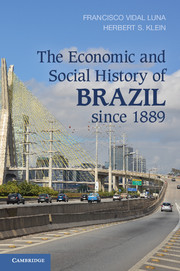Crossref Citations
This Book has been
cited by the following publications. This list is generated based on data provided by Crossref.
GÓMEZ LEÓN, MARÍA
2018.
The rise of the middle class in Brazil, 1850–1950.
European Review of Economic History,
Fischer, Brodwyn
2018.
State and Nation Making in Latin America and Spain.
p.
372.
Camps-Cura, Enriqueta
2019.
Changes in Population, Inequality and Human Capital Formation in the Americas in the Nineteenth and Twentieth Centuries.
p.
9.
Franken, Daniel
2019.
ANTHROPOMETRIC HISTORY OF BRAZIL, 1850–1950: INSIGHTS FROM MILITARY AND PASSPORT RECORDS.
Revista de Historia Económica / Journal of Iberian and Latin American Economic History,
Vol. 37,
Issue. 2,
p.
377.
Schneider, Nina
2019.
Origins of child rights governance: The example of early child labour legislation in the United States and Brazil.
Childhood,
Vol. 26,
Issue. 3,
p.
289.
Souchaud, Sylvain
2019.
Géographie de l’atelier.
p.
325.
Gurkov, Igor
Kokorina, Alexandra
Saidov, Zokirzhon
and
Balaeva, Olga
2020.
Foreign Direct Investment in a Stagnant Economy: Recent Experience of FDI in Manufacturing Facilities in Russia.
Journal of East-West Business,
Vol. 26,
Issue. 2,
p.
109.
Klein, Herbert S.
and
Luna, Francisco Vidal
2020.
Modern Brazil.
Kopper, Christopher
2021.
Big Business and Dictatorships in Latin America.
p.
319.
Howes, Robert
2021.
Latin America and the Marshall Plan: the critique from Brazil of Roberto Simonsen.
Journal of Transatlantic Studies,
Vol. 19,
Issue. 4,
p.
441.
Guimarães, Carlos Gabriel
and
Greenhill, Robert
2021.
TRADING IN AN EMERGING MARKET: E. JOHNSTON & CO AND THE BRAZILIAN COFFEE TRADE 1840-1880.
Revista de Historia Económica / Journal of Iberian and Latin American Economic History,
Vol. 39,
Issue. 1,
p.
157.
Gómez León, María
2021.
THE KUZNETS CURVE IN BRAZIL, 1850-2010.
Revista de Historia Económica / Journal of Iberian and Latin American Economic History,
Vol. 39,
Issue. 1,
p.
37.
Fischer, Brodwyn
2022.
Historicising informal governance in 20th century Brazil.
Contemporary Social Science,
Vol. 17,
Issue. 3,
p.
205.
Hilgers, Tina
Calderón, Anna
and
Honigmann, Max
2022.
Tensions between the Middle Classes and the “New Middle Class” in Brazil: An Accidental Biographical Ethnography.
Latin American Research Review,
Vol. 57,
Issue. 3,
p.
536.
Álvarez, Jorge
and
Prado, Svante
2022.
Scandinavia and South America—A Tale of Two Capitalisms.
p.
1.
Campos, Nauro
Glebkina, Ekaterina
Karanasos, Menelaos
and
Koutroumpis, Panagiotis
2023.
Financial Development, Political Instability, Trade Openness and Growth in Brazil: Evidence from a New Dataset, 1890-2003.
Open Economies Review,
Vol. 34,
Issue. 4,
p.
831.
Hanusch, Marek
Zaourak, Gabriel
Ferreira Filho, Joaquim Bento de Souza
and
Bardal, Diogo
2023.
A Balancing Act for Brazil's Amazonian States: An Economic Memorandum.
p.
87.
Badia-Miró, Marc
Carreras-MarÍn, Anna
and
Huberman, Michael
2023.
Smooth sailing: market integration, agglomeration, and productivity growth in interwar Brazil.
European Review of Economic History,
Vol. 27,
Issue. 1,
p.
45.





